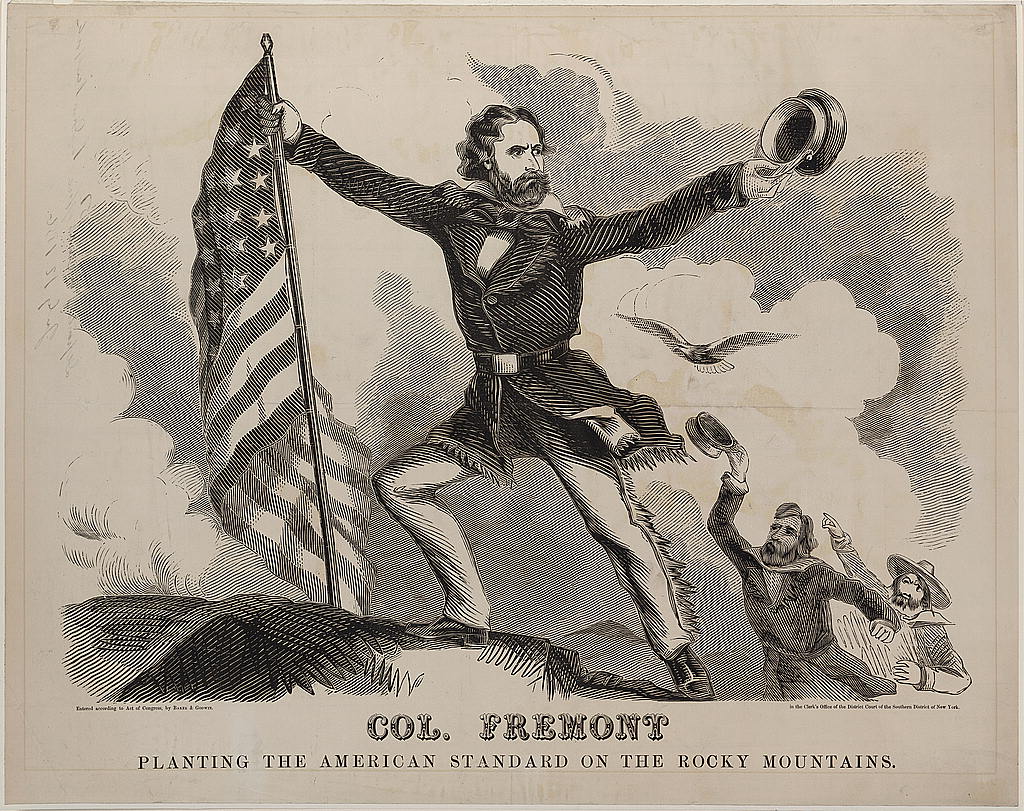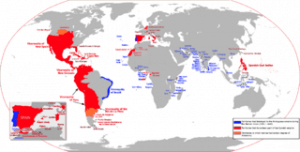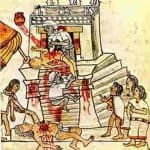Contenidos
Puritanismo, racismo y supremacismo
Destino Manifiesto
Dios y el puritanismo
La vanidad, es la cosa
Del mismo modo que Inglaterra buscó en Dios el fierabrás para paliar sus derrotas y enfrentar a la España que la derrotaba militarmente, la potencia secular moderna, y hasta el nuevo fracaso del Plan Maitland-Pitt en Buenos Aires en 1806 y 1807, el puritanismo estadounidense hace que la política de EEUU tenga a Dios a todas horas en la boca, además de su mantra «Dios salve a América» (sic).
EEUU abrazó el relato anglosajón en el XIX con el «destino manifiesto», la «Doctrina Monroe» y la guerra hispanoamericana de 1898.
Pareciera que quisieran ser un remedo de nuevo «pueblo elegido»… Del mismo modo que el relato negrolegendario antiespañol busca laminar el orgullo de pertenencia, los nuevos imperios como el yanki se asientan en un relato de superioridad, «el mejor país del mundo», se repite en su día a día…
Y nosotros, desunidos, peleando por desdecir el relato negativo y castrador que nos han puesto en la boca y extiende el relato oficial y académico… (Jordi Núñez Zaragoza)
Imperialismo
Asimismo, el Destino Manifiesto ha servido a EEUU para justificar acciones tanto dentro como fuera de sus propias fronteras.
Cumplimiento del destino
“El cumplimiento de nuestro destino manifiesto es extendernos por todo el continente que nos ha sido asignado por la Providencia, para el desarrollo del gran experimento de libertad y autogobierno”.
«la última y mejor esperanza sobre la faz de la Tierra»
El término sería utilizado también a finales del s. XIX por los republicanos para justificar operaciones fuera del territorio estadounidense, como es el caso de Cuba y Puerto Rico.
Destino manifiesto: puritanismo, racismo y supremacismo.
Destino Manifiesto
Imperialismo.
John L. O’Sullivan en 1845
“El cumplimiento de nuestro destino manifiesto es extendernos por todo el continente que nos ha sido asignado por la Providencia, para el desarrollo del gran experimento de la libertad y autogobierno».
Utilizada por ambos partidos
«la última y mejor esperanza sobre la faz de la tierra»
Primeras consecuencias
Adaptada a los tiempos
Falseando su historia
Adoctrinamiento político
Creando una ficción
Análisis de su historia
Ocupación de territorios hispanos
La anexión de la mitad de México
Algo sin Parangón.
Lo ocurrido en México en 1848 no tiene parangón en la historia mundial. Ninguna nación ha perdido 2.378.539 km2 de su suelo patrio en un lapso tan corto de tiempo en ningún periodo de la historia. Han podido ser perdidas colonias, protectorados o territorios de ultramar; nunca semejante superficie anexionada por otra nación, de suelo patrio en toda la historia mundial y en un periodo temporal tan breve.
Conviene diferenciar entre un proceso de «independencia» y otro de «anexión». La independencia significa que un territorio, con su población, se desgaja de la nación a la que pertenece y se convierte en un estado soberano. La anexión significa, llana y ramplonamente, que una nación soberana se apropia del territorio de otra nación soberana y lo hace suyo.
No se trata de hacer juicios de valor, sino de constatar unos datos objetivos de la historia, que están ahí y que deberían reclamar el interés de los estudiosos de la historia y del público en general. No ha habido otro acontecimiento similar en toda la historia del mundo; sin embargo, llama la atención que, en demasía, se pase sobre él como de puntillas. ¿Hay algún interés poderoso que presione para empequeñecerlo o esconderlo? ¿Alguien mueve los hilos entre bambalinas para frenar o detener su difusión?
La mayor anexión de suelo patrio de la historia mundial ha sido la mexicana. Lo cual cambió el rumbo del curso histórico posterior. Nueva España/México que estaba llamado a ser la potencia de América entró en una vía de crisis interminables. Estados Unidos se fue elevando a gran potencia mundial merced a esa expansión y, de ese modo, decantó los acontecimientos del siglo XX.
Estados Unidos consigue conectar la costa este con la costa oeste merced a la impresionante construcción del ferrocarril y, con ello, se enlazan dos océanos. El tráfico de personas y mercancías se multiplica de un modo descomunal. Los yacimientos de petróleo de Texas sirven de sustento y empuje para el formidable desarrollo económico e industrial de los Estados Unidos. La posición geoestratégica de estos territorios es envidiable e incomparable. Las riquezas naturales que atesoran sobrepasan todos los márgenes.
Si bien se piensa, parece una pesadilla, un cuadro surrealista o una película de terror, reflejar que haya sucedido un hecho histórico de esa colosal magnitud. California, Nevada, Utah, Colorado, Arizona, Nuevo México y Texas, con sus inmensas riquezas, pasaron a otra nación en un escalofriante breve plazo de tiempo. Elevaron a Estados Unidos al podio de potencia hegemónica mundial y a México lo hundieron en su particular infierno.
Pocos quieren resaltarlo y recordarlo, pese a constituir un acontecimiento histórico inigualable. En cambio, el oro y la plata que se llevaron los españoles de América está en boca de todos y se sirve en todos los platos. Tengamos presente que el oro que España extrajo de toda América en 150 años es el equivalente aproximado del que México extrae actualmente en año y medio. Y la plata extraída en las mismas condiciones es la misma que Perú produce en la actualidad en cinco años (Cfr. ABC Historia, 09/07/2022).
¿No da que pensar y huele a tenebrosa malquerencia que un acontecimiento histórico que bate todos los récords y resulta trascendental para entender la historia contemporánea se reduzca y ensombrezca, mientras que otros que no alcanzan –ni de lejos– tal envergadura se magnifiquen y aireen con inusitada profusión?
Esclavitud en Texas
Después de la independencia de Texas (1836) y durante la guerra con Estados Unidos (1846-1848), las élites mexicanas utilizaron la pluma como arma de defensa ante la hegemonía estadunidense.
Escribieron acerca de la igualdad de todos los seres humanos, haciendo énfasis en la abolición de la esclavitud para diferenciarse de las prácticas esclavistas de los norteamericanos y de otras potencias europeas, como España. De esta manera, se argumentaba que la nación mexicana tenía una posición moral más elevada.
Un ejemplo de esto puede encontrarse en la edición del 15 de octubre de 1842 del periódico “El Siglo Diez y Nueve”:
“[…] sin que en México se piense en libertad para unos y en esclavitud para otros, como se practica vergonzosamente en algunos países, que de un modo gratuito se han creído el emporio de la ilustración y de la justicia, cuando con un pretexto criminal á par que ridículo, el color de una piel, atan perpetuamente las manos de nuestros semejantes, y ponen sobre sus cervices un yugo de hierro […] ¡Oh! […] México jamás pensará de esa manera!”
Principios supremacistas y expansión
Abel Upshur, en 1843
«Ningún hombre que conozca algo de su propia naturaleza puede suponer que es posible que dos razas de hombres, distinguidas por marcas externas e indelebles que son obvias a los ojos de todos, que han mantenido entre ellas desde tiempos inmemorables la relación de señor y esclavo, puedan jamás vivir juntas como iguales en el mismo país y bajo del mismo Gobierno».
John Berrien en 1847
«¿Ustedes están dispuestos a arriesgar sus derechos adquiridos por nacimiento para cuidar de las razas mestizas que habitan este territorio, incorporándolas a la Unión?».
Washington Hunt
«Piensen en el carácter de la población que debe entrar en nuestra confederación. Tenemos que prepararnos para recibir una masa incongruente de españoles, indios y mexicanos mestizos (mongrel), una mezcla de razas que no van a disfrutar ni a participar en la administración de nuestras instituciones libres, hombres de sangre y lenguaje diferente que no pueden mezclarse con nuestro pueblo en pie de igualdad social y política».
«Ellos tienen que ser gobernados como una posesión colonial, bajo leyes provisionales, pues caso sean incorporados en nuestro sistema federal se convertirán en fuente eterna de desorden, anarquía y conmoción civil».
John Caldwell Calhoun en 1848
«Nosotros nunca hemos soñado con incorporar a nuestra Unión cualquier otra raza que no sea la Caucásica, la raza libre de los blancos. La incorporación de México seria el primer caso de incorporación de la raza india, puesto que más de la mitad de los mexicanos son indios y el resto está formado principalmente por tribus mixtas. ¡Yo protesto contra esa unión!. El nuestro es el Gobierno de la raza blanca. Los grandes infortunios de la América española son consecuencias del error fatal de poner esas razas de color en pie de igualdad con la raza blanca».
Albert Beveridge
«Dios no ha preparado a los pueblos de habla inglesa y a los Teutónicos por mil años en vano o para la indolente contemplación y admiración de ellos mismos. ¡No!. Él ha hecho de nosotros los grandes organizadores del mundo para establecer un sistema donde no impere el caos. Él nos ha dado el espíritu del progreso para derrotar a las fuerzas de la reacción en la tierra. Él ha hecho de nosotros adeptos del gobierno para que podamos administrar gobierno a los pueblos seniles y salvajes. Si no fuera por esa fuerza, el mundo caería en la peor barbarie y en la oscuridad. Y de toda nuestra raza, Él escogió el pueblo Americano como la nación para finalmente guiar la regeneración del mundo. Esa es la misión divina de América, y como tal, nos proporciona todo el lucro, la gloria y la felicidad posible al hombre. Nosotros somos los encargados del progreso del mundo, los guardianes de su paz virtuosa».
Ephraim George Squiee en 1849
«Si Estados Unidos, comparado con las repúblicas de la América española, alcanzó un progreso inconmensurable en todos los elementos de su grandeza, esto se debe eminentemente al rechazo tajante e inexorable de la raza teutónica a rebasar su sangre, su intelecto y sus principios morales, y poner en peligro sus instituciones mezclándose a hombres de razas inferiores y subordinadas. En obediencia al Cielo, esta raza ha salvado a la mitad del continente de las bestias salvajes y de hombres aún más salvajes… Solamente con un sistema juicioso de colonización que pueda garantizar el predominio de la sangre blanca, al mismo tiempo que introduzca inteligencia, industria y habilidades, América Central podrá soñar en conseguir la paz, prosperidad y grandeza».



